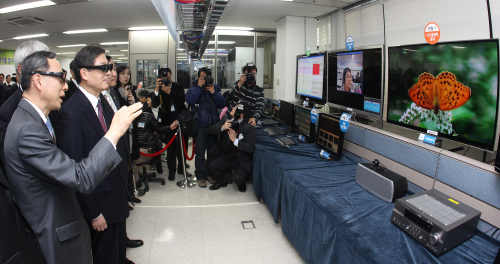Imagine yourself using your smartphone to download a movie during a single bus journey.
In addition to the longer time required to complete the download, one could consider himself or herself lucky if it is completed in a single go with the current third generation networks.
The government announced late last month that the state-run Electronics and Telecommunications Research Institute in Daejeon demonstrated the new fourth generation mobile communication technology Long Term Evolution-Advanced for the first time.
LTE-A is 40 times faster than the current 3G wireless network and it boasts a speed of up to 600 megabytes of data per second.
This means that people could download a 700-megabyte video in just 9.3 seconds, whereas it took up to six minutes and 30 seconds with the 3G networks.
“It is meaningful that we demonstrate this high-capacity, super-speed telecom service ― which enables users to watch 3-D, high-definition videos in a driving car ― for the first time in the world,” said government officials.
The research, led by ETRI, took more than five years and cost the institute more than 64 billion won ($53 million). The mobile communication technology is expected to be available in Korea by 2014.
The move takes place as the government projects that the global telecom market size will grow from the current $1.1 trillion to $1.3 trillion over the next six years, with the increasing number of smartphone users and the rising demand for wireless Internet.
 |
Prime Minister Kim Hwang-sik watches the 3-D moving pictures service demonstration at the 4G telecommunications technology briefing session in Daejeon last month. (Yonhap News) |
In a related effort, the country’s mobile carriers SK Telecom and LG Uplus are planning to commercialize the 3.9 generation mobile broadband technology Long Term Evolution ― the previous version of LTE-A ― by this year. KT Corp. is likely to introduce it next year.
“More details about the new technology are expected to be released by the end of this year. This year is considered to be a test bed and the LTE scheme will be specified next year,” said a KT official.
Meanwhile, the country’s top mobile carrier SKT said it will commercialize the LTE technology in July starting in Seoul. The company will then commercialize it in metropolitan areas in 2012 and form a nationwide network in 2013.
The three telecoms have pledged that they would spend more than 6 trillion won in establishing LTE networks across the nation until 2014.
Last June, the Korea Communications Commission announced that two key mobile communication technologies ― LTE-A and WiBro Evolution ― were recently chosen as 4G global standards by the International Telecommunication Union.
ITU is an international organization which specializes in deciding standards on radio and telecommunications.
The organization will complete developing the specific standardization framework for the new technologies by June and grant final approval in February 2012 at the World Radiocommunication Conference.
“It is important that the technology is listed as a standardized one when countries, especially the developing nations, choose new telecommunication services,” said Kim Dae-jung, a director at the Telecommunications Technology Association.
He added that the standardization effort also helps when trying to export it overseas.
The initiative for technology standardization was taken forward by the TTA, which worked in cooperation with groups based in other nations such as Japan and the U.S.
However, obstacles lie ahead for the successful launch of the next generation technology, which is soon projected to be standardized.
An eco-system for the 4G networks must be established, indicating that mobile platforms and software services must be further developed in a country which already has strong electronic hardware manufacturers.
Hyung Tae-geun, a commissioner at the KCC, also said that regulations involving the newly emerging medical and smart work systems must be eased and systematic support measures must be drafted for software and contents developers for the country to steer the 4G network era.
“The 4G mobile broadband networks for wireless Internet must be established at an early date so that a super, two-way information highway for mobiles could be created,” he said. “Having the number of Wi-Fi zones must be more than doubled by the latter half of this year, many countries will put their focus on Korea as it launches the LTE service, serving as the world’s best information and communication technology test bed.”
By Cho Ji-hyun (
sharon@heraldcorp.com)








